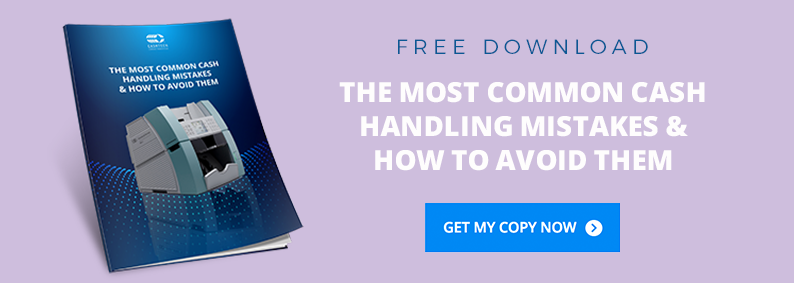Running a grocery store has never been more difficult than it is now. New and non-traditional competition is heating up while profits are razor thin. Pressures are also intense to adapt to changing consumer behaviors as shoppers expect a more pleasant shopping experience from their grocery stores.
In your bid to improve operational efficiency and the customer experience, you may not have immediately considered the impact that better grocery store cash handling may have on your store’s profits. However, cash continues to play a crucial role in the grocery sector, with cash accounting for 43% of all grocery store transactions. This is good news considering cash may reduce the risk of fraud, support your cash flow, and cost less than other forms of payment.
By taking the time to improve cash handling, you will speed up transactions while also increasing productivity, reducing labor costs, and reducing costly errors and losses, as well. Due to the benefits, it’s worth prioritizing better cash handling.
1. Update Your Cash Handling Policies and Train Employees
Many grocery stores continue to use the same manual cash handling policies and procedures they created decades ago. It may be time to review, revise, and update these policies to create a set of rules for employees to follow that’s simple and effective. You may want to reduce the amount of cash allowed in the till, only authorize certain employees to handle cash, put policies in place for sharing and locking cash registers, and have procedures in place to record the movement of cash throughout the day. It’s also a good idea to have instructions in place for all discounts and returns.
Train all new and existing employees on the new policies, print them out and place them around the tills and in the back office.
2. Create Accountability
Greater accountability will reduce many cash handling losses and problems. Sometimes, it’s as simple as ensuring you are keeping track of the movement of cash throughout the day and assigning different stages of the cash handling process to different employees. That means one employee is not handing cash from the transaction to the deposit. Having more people involved will help you identify and track errors. Ideally, you should have different employees accountable for counting cash, verifying the amount, and depositing it.
3. Invest in Technology
Grocery store technology for cash management is on the rise, and for good reason. Automated devices like coin and banknote recyclers and smart deposit safes reduce the labor costs associated with manual cash handling, while enhancing productivity and accountability. They provide an audit trail and reduce errors and losses as well. When used at the cash register, cash management technology may also reduce the time it takes to process transactions, which may reduce wait times and improve the shopping experience.
According to the National Grocers Association, store cash audits take an average of 3 hours per day and counting drawers takes an average of 3.5 hours per day. Automating these tasks will significantly reduce labor costs, cut overtime, and increase operational efficiency.



